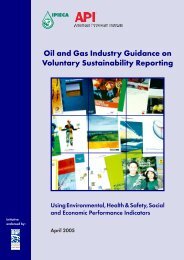Technology Cooperation and Capacity Building - CommDev
Technology Cooperation and Capacity Building - CommDev
Technology Cooperation and Capacity Building - CommDev
You also want an ePaper? Increase the reach of your titles
YUMPU automatically turns print PDFs into web optimized ePapers that Google loves.
TECHNOLOGY COOPERATION AND CAPACITY BUILDINGI N T E R V I E WPaul CoutrierPaul Coutrier, formerly Pertamina’s chief representative in London,is now Deputy Minister of the Environment in Indonesia.‘The oil industry has played a prominentrole in Indonesia’s economic development,particularly since the early 1970s,’ says PaulCoutrier, pointing out that in those daysabout 70 per cent of the country’s foreigncurrency earnings came from the oil <strong>and</strong>gas industry. Although the oil industry is100-years-old in Indonesia, it was onlyafter 1968, with the coming of Indonesia’sso-called New Order, that the industryreally took off.Environmental issues soon becameimportant. ‘In 1974,’ says Coutrier, ‘fouryears before we even had a Ministry of theEnvironment, Indonesia enacted legislationto prevent offshore pollution <strong>and</strong> abate oilspills. By then we had also started to buildnew refineries to very high environmentalspecifications, taking elaborate precautionsto protect local populations from bothpollution <strong>and</strong> noise.<strong>Technology</strong> cooperation, saysCoutrier, has been vital to thedevelopment of environmentally-soundforms of oil <strong>and</strong> gas exploitation.Indonesia is, since the last ten years, thebiggest producer of liquefied natural gas(LNG) in the world <strong>and</strong> the biggestsupplier of LNG to the Japanese market.‘This could not have been achievedwithout technology cooperation. Wewould never have known, for example,how to cope with the organic forms ofmercury found in natural gas. In this sense,technology cooperation for developmentis also technology cooperation for theenvironment. The two go h<strong>and</strong> in h<strong>and</strong>.’Why, then, is the oil industry’scontribution to technology cooperation‘<strong>Technology</strong> cooperation <strong>and</strong> capacity buildingbetween countries are vital to ensure that allforms of development integrate economic,environmental <strong>and</strong> social effects. Only in thisway can we hope to arrive at what I like tocall “development without antagonism.” ’so rarely recognized in internationaldebates? Coutrier doesn’t hesitate. ‘It’s amatter of language. The oil industry hasnever been able to capitalize on its ownperformance. For example, whereIndonesia’s refineries emit wastes into thesea, the effluent is subjected to a series oftreatments through which the oxygencontent is enhanced <strong>and</strong> eutrophicationpotentially reduced to harmless levels. Ifanyone asked me, I could speak for atleast a week just on the subject of thepetroleum industry’s contribution to theenvironment in Indonesia. But no onedoes ask me, <strong>and</strong> the story remainslargely untold.’Why is this? ‘One reason’, saysCoutrier, ‘is that technical experts withinthe industry find it hard to single outenvironmental contributions from purelytechnical ones. It is very important, then,that organizations such as IPIECA help theindustry publicize its environmentalcontributions. The oil industry has done somuch but the industry doesn’t even knowit. And if the oil industry does notappreciate what it has done, how can theoutside world?’Coutrier believes that from now onenvironmental technology must be built intonew production technologies as they aredeveloped. ‘We have made a good starthere in Indonesia. For example, it is now alegal requirement to make an environmentalimpact assessment as an integral part of allfeasibility studies. This must not only assessphysical <strong>and</strong> environmental impacts but alsosocial impacts.’Whatever we do now, says Coutrier,will affect us far into the future.‘<strong>Technology</strong> cooperation <strong>and</strong> capacitybuilding between countries are vital toensure that all forms of developmentintegrate economic, environmental <strong>and</strong>social effects. Only in this way can wehope to arrive at what I like to call“development without antagonism.”’9


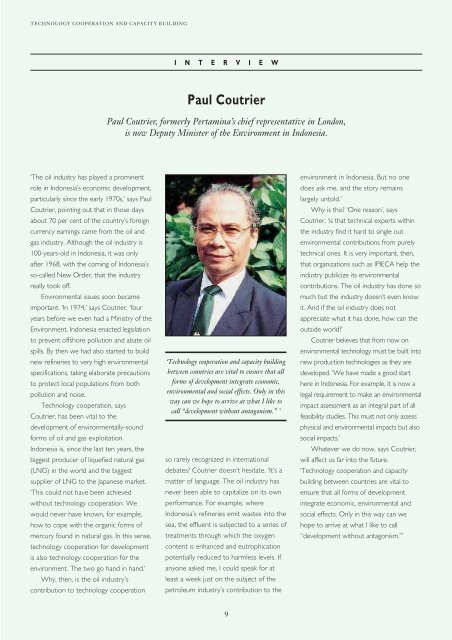

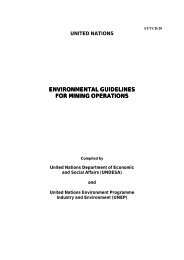
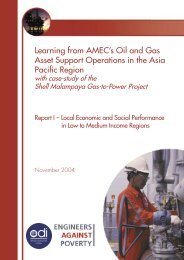
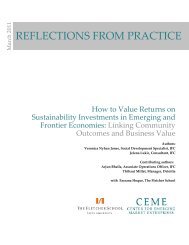
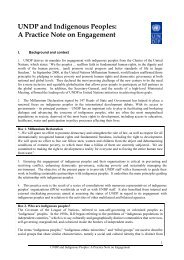
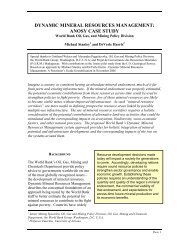
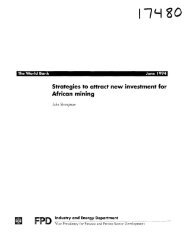

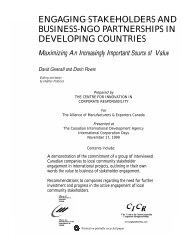



![[PDF] Community Development Toolkit - CommDev](https://img.yumpu.com/48616495/1/184x260/pdf-community-development-toolkit-commdev.jpg?quality=85)
